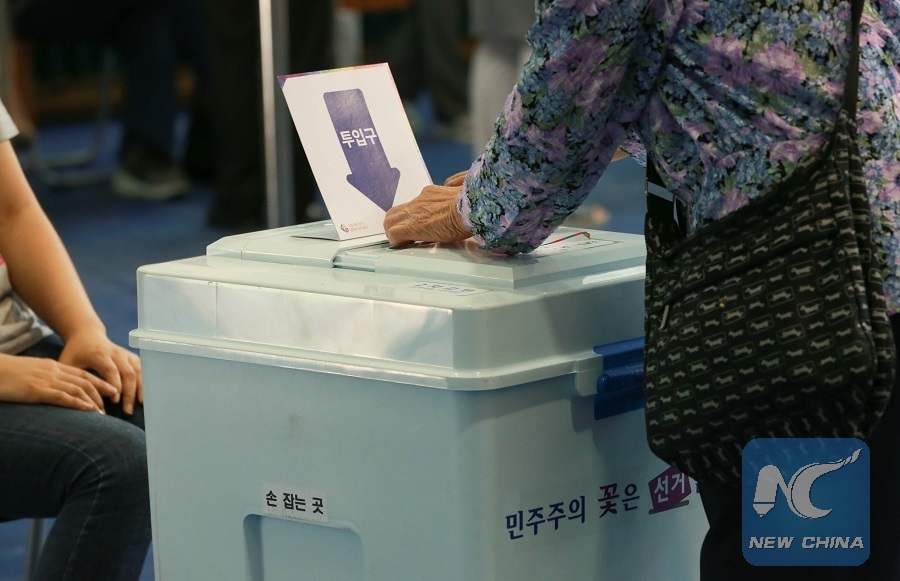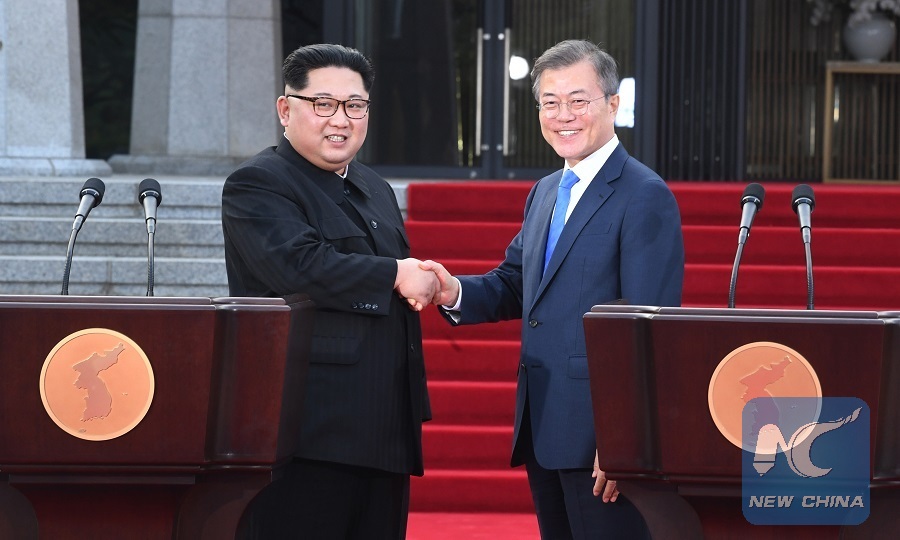
A voter casts her ballot at a polling station in Seoul, South Korea, June 13, 2018. (Xinhua/Wang Jingqiang)
By Yoo Seungki
SEOUL, June 14 (Xinhua) -- Public support for South Korean President Moon Jae-in's drive for peace on the Korean Peninsula helped his ruling party win a sweeping victory, the biggest the Democratic Party ever recorded in local elections.
Moon's ruling Democratic Party snapped 14 posts out of 17 major mayoralties and provincial governorships in the seventh round of quadrennially-held local elections, the National Election Commission said Thursday. The elections to pick 4,016 administrative, legislative and educational posts were conducted nationwide Wednesday.
The landslide victory came in the wake of Moon's peace drive to denuclearize the Korean Peninsula and bring peace and stability to the peninsula and the region, which stoked widespread support among conservative voters beyond liberal ones.
Moon held the third-ever inter-Korean summit with top leader of the Democratic People's Republic of Korea (DPRK) Kim Jong Un at the truce village of Panmunjom on April 27. About a month later, they met again to re-affirm the commitment to denuclearization of the peninsula and improved inter-Korean relations.

South Korean President Moon Jae-in (R) and Kim Jong Un, top leader of the Democratic People's Republic of Korea (DPRK) shake hands during a press conference at the border village of Panmunjom, on April 27, 2018. (Xinhua/Inter-Korean Summit Press Corps)
A historic summit was held in Singapore Tuesday between Kim and U.S. President Donald Trump. Pyongyang and Washington agreed on complete denuclearization of the Korean Peninsula in exchange for security guarantees for the DPRK.
The series of landmark events in recent months triggered hopes for lasting peace on the peninsula, and the restart of inter-Korean economic cooperation which has been banned under UN sanctions over Pyongyang's nuclear and ballistic missile developments.
The Democratic Party chanted a slogan that peace can bring economic benefits to South Korea, which is faced with a longstanding low growth since the 2008 global financial crisis.
The record-low borrowing costs encouraged South Korean households to purchase new home with borrowed money, resulting in massive household debts and pressure on private consumption.
If the inter-Korean economic cooperation is resumed with the complete denuclearization and the lifting of sanctions that will allow South Korean companies to invest in the DPRK infrastructure, it can be a breakthrough for a lackluster South Korean economy as well as the DPRK economy, observers said.
Peace on the Korean Peninsula can also reduce defense costs for South Korea, about 10 percent of its total annual budget, that can be re-allocated to social welfare and healthcare as well as new growth engines. It persuaded voters to support Moon's governing party.
The local elections came together with by-elections to fill 12 vacant parliamentary seats in the 300-member National Assembly. The Democratic Party secured 11 seats, while the main conservative opposition Liberty Korea Party added only one seat at the Gimcheon city in North Gyeongsang province, a traditional home turf of the conservative bloc.
The Democratic Party increased its parliamentary seats to 130 in the unicameral assembly, followed by the Liberty Korea Party with 113 seats. The left-centrist Party for Democracy and Peace and the minor progressive Justice Party, which are favorable to Moon's peace drive, maintained 14 seats and six seats, respectively.
The number of lawmakers, affiliated with the three pan-liberal political parties, and liberal independent legislators topped half of the 300-member parliament, boosting expectations for Moon's peace drive to be made law. It would institutionalize inter-Korean agreements regardless of political situations.

